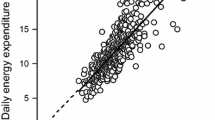Summary
The effect of a 5-month endurance training programme on physical activity and average daily metabolic rate (ADMR) was studied. Subjects were 16 males and 16 females preparing for a half marathon. Total physical activity, measured using an accelerometer, had increased by 62% and 63% after 20 weeks in males and females, respectively. Physical activity during the non-exercise part of the day did not change although in males it tended to increase (15%, NS). The ADMR had increased significantly in males after 8 and 20 weeks (+2.3 and +3.3 MJ· day−1, respectively,P<0.05) and exceeded the net energy expenditure for endurance-training three to four times. In females no significant increase in ADMR was found (+ 1.5 and + 1.3 MJ·day−1, after 8 and 20 weeks, respectively). In females the change in ADMR could be largely attributed to the net cost of running itself and a small increase (10%) in resting metabolic rate during the time of day they were awake. In males a discrepancy was observed between the increase of ADMR and the expenditure due to exercise and non-exercise activities. We suggest exercise stimulates habitual physical activity and diet-induced thermogenesis in males but not in females.
Similar content being viewed by others
References
Bingham SA, Goldberg GR, Coward WA, Prentice AM, Cummings JH (1989) The effect of exercise and improved physical fitness on basal metabolic rate. Br J Nutr 61:155–173
Cotes JE, Meade F (1960) The energy expenditure and mechanical energy demand in walking. Ergonomics 36:97–119
Dale D van, Saris WHM, Schoffelen PFM, Hoor F ten (1987) Does exercise give an additional effect in weight reduction regimes? Int J Obes 11:367–375
Dale D van, Schoffelen PFM, Hoor F ten, Saris WHM (1989) Effects of adding exercise to energy restriction on 24-hour energy expenditure, resting metabolic rate and daily physical activity. Eur J Clin Nutr 43:441–451
Durnin JVGA, Passmore R (1967) Energy, work and leisure. Heineman, London
Elliot DL, Goldberg L, Kuehl KS, Bennet WM (1989) Sustained depression of the resting metabolic rate after massive weight loss. Am J Clin Nutr 49:93–96
Garrow JS (1987) Effect of exercise on obesity. Acta Med Scand [Suppl] 711:67–73
Janssen GME, Hoor F ten (1989) Marathon running: functional changes in male and female subjects during training and contests. Int J Sports Med 10 [Suppl 3] S118-S123
Kjœr M (1989) Epinephrine and some other hormonal responses to exercise in man: with special reference to physical training. Int J Sports Med 10:2–15
Leibel RL, Hirsch J, Berry EM, Gruen RK (1985) Alterations in adipocyte free fatty acid reesterification associated with obesity and weight reduction in man. Am J Clin Nutr 42:198–206
Meijer GA, Westerterp KR, Koper H, Hoor F ten (1989) Assessment of energy expenditure by recording heart rate and body acceleration. Med Sci Sports Exerc 21:343–347
Meijer GAL, Westerterp KR, Seyts GHP, Janssen GME, Saris WHM, Hoor F ten (1991) Body composition and sleeping metabolic rate in response to a 5-month endurance training programme in adults. 62:18–21
Molé PA, Stern JS, Schutz CL, Bernauer EM, Holcomb BJ (1989) Exercise reverses depressed metabolic rate produced by severe caloric restriction. Med Sci Sports Exerc 21:29–33
Paffenbarger RS, Hyde RT (1985) Exercise in the primary prevention of ischemic heart disease. In: Welsh RP, Shephard RJ (eds) Current therapy in sports medicine. BC Decker Inc, Toronto, Philadelphia, pp 76–80
Pavlou KN, Stefee WP, Lerman RH, Burrows BA (1985) Effects of dieting and exercise on lean body mass, oxygen uptake, and strength. Med Sci Sports Exerc 17:466–471
Quetelet LAJ. Antropométrie on mesure des différences facultes de l'homme. Brussels. Muquardt
Ravussin E, Burnand B, Schutz Y, Jéquier E (1985) Energy expenditure before and during energy restriction in obese patients. Am J Clin Nutr 41:753–759
Reiff GG, Montoye HJ, Remington RD, Napier JA, Metzner HL, Epstein FH (1967) Assessment of physical activity by questionnaire and interview. J Sports Med Phys Fitness 7:135–142
Saris WHM (1989) Physiological aspects of exercise in weight cycling. Am J Clin Nutr 49:1099–1104
Schoeller DA, Ravussin E, Schutz Y, Acheson KJ, Baertschi P, Jéquier E (1986) Energy expenditure by doubly labeled water: validation in humans and proposed calculation. Am J Physiol 250:R823-R830
Sims EAH, Danforth E (1987) Expenditure and storage of energy in man. J Clin Invest 79:1019–1025
Thompson KJ, Blanton P (1987) Energy conservation and exercise dependence: a sympathetic arousal hypothesis. Med Sci Sports Exerc 19:91–99
Tremblay A, Despres J-P, Leblanc C, Bouchard C (1984) Sex dimorphism in fat loss in response to exercise training. J Obes Weight Reg 3:193–203
Tremblay A, Després J-P, Bouchard C (1985) The effects of exercise-training on energy balance and adipose tissue morphology and metabolism. Sports Med 2:223–233
Weigle DS, Sande KJ, Iverius PH, Monsen ER, Brunzell JD (1988) Weight loss leads to a marked decrease in non-resting energy expenditure in ambulatory human subjects. Metabolism 37:930–936
Weststrate JA, Kooy K van der, Deurenberg P, Hautvast JGAJ (1989a) Surprisingly large impact of psychological stress on diet-induced thermogenesis but not on resting metabolic rate. Thesis, Wageningen, The Netherlands, pp 131–139
Weststrate JA, Deurenberg P, Hautvast JGAJ (1989b) Nature and magniture of inter-individual differences in resting metabolic rate and diet-induced thermogenesis in lean and obese individuals. Thesis, Wageningen, The Netherlands, pp 140–159
World Health Organization (1985) Energy and protein requirements. Report of a joint FAO/WHO/UNO expert consultation. WHO, Geneva. Technical Report series no. 724, pp 71–79
Author information
Authors and Affiliations
Rights and permissions
About this article
Cite this article
Meijer, G.A.L., Janssen, G.M.E., Westerterp, K.R. et al. The effect of a 5-month endurance-training programme on physical activity: evidence for a sex-difference in the metabolic response to exercise. Europ. J. Appl. Physiol. 62, 11–17 (1991). https://doi.org/10.1007/BF00635626
Accepted:
Issue Date:
DOI: https://doi.org/10.1007/BF00635626




